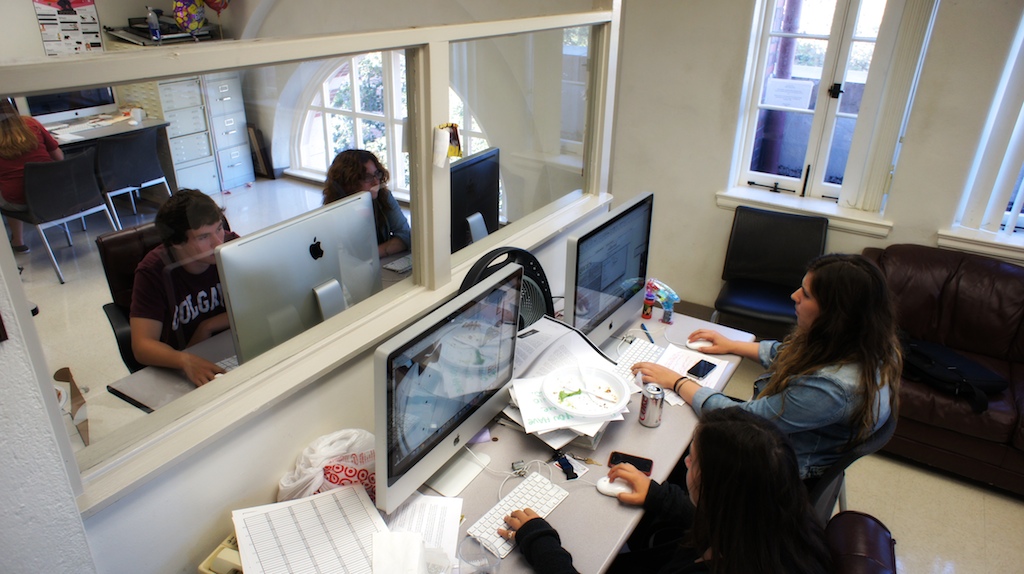Signing off: On good journalism

When I first tiptoed through the door of the Daily Trojan newsroom almost four years ago, unsure of my role at the student-run publication, let alone my purpose in the world, I was a very different person and the world was a very different place.
The nervous freshman staff writer who idolized the upperclassmen on the editorial board wouldn’t have believed you if you told her she would rise through the ranks and ultimately take on the role of opinion editor — covering a presidential election, a global pandemic and the international reckoning on systemic anti-Blackness and radicalized oppression during one of the most tumultuous semesters to date.
The Daily Trojan has been a big part of my life since the moment I began my academic career at USC and continues to be so as I approach graduation day. This column has been my safe haven, my sounding board and a meaningful vehicle of self-expression for two of those years. I never imagined I’d be sitting here writing my final DT article, my final installment of “The Afterword.”
But here I am.
From all the University’s scandals (Operation Varsity Blues, the double life of former Keck School of Medicine dean Carmen Puliafito and the allegations against former campus gynecologist George Tyndall that put USC in the Los Angeles Police Department’s largest sex abuse investiation to date) to historical moments that shifted the sociopolitical fabric of the nation (Donald Trump’s divisive presidency, the coronavirus pandemic and the global takeover of pop culture by social media), the past four years have proven there is no more fascinating, important time to be a student journalist.
That’s what drew me to the Daily Trojan in the first place — a desire to both write history and stand on the right side of it. I think that’s what motivates a lot of journalists. When I took on the role of opinion editor in the fall of 2020 at the height of the pandemic and amid intense, interwoven sociopolitical tensions, the job felt like a moral, ethical and intellectual responsibility.
I became adept at parceling out contentious yet valuable perspectives from ignorant thinking, learned what it meant to ensure that underserved communities were represented by those who understood their lived experiences and found a way to keep the opinion section’s duty to foster a diversity of viewpoints alive while the world around us eroded into polarizing, restrictive partisanship.
It was this leadership position that helped me understand what it really means to have a voice. The ability to be articulate, succinct and provocative confers both power and responsibility. Journalism is about elucidating ideas, protecting them from erasure and enabling others to use these ideas in ways that help them reconcile their existence with a world notorious for its incongruence.
I am honored to have had the opportunity to lead this charge and to die on the hills of tolerance, disruption and radical reform publicly and proudly. I would die on each of those hills over and over again for as long as it takes to enact substantive change and so would the rest of the Daily Trojan newsroom. That, not impersonal objectivity, is what journalism is about: people who use the unwavering power of words to fuel critical thought and challenge the status quo.
The freedom of the press should be non-negotiable for any democratic society, but in the age of clickbait and fake news, enough circulation can turn lies into half-truths dispeled through the pulse of the nation at an exponential rate. The integrity of modern journalism has been and continues to be under scrutiny and rightfully so: The lines delineating what is opinion, what is fact and what is objectivity have become increasingly blurred.
As I pass along the torch to the next opinion editor, the next opinion columnist, the next nervous freshman staff writer who doesn’t yet know how important their work will be, the message I want to send is that good journalism still matters and still works. Good journalism is the 10-minute video taken by 17-year-old Daniella Frazier of George Floyd’s death that led to his murderer’s conviction on all three charges last week. Good journalism is equally the months spent by Daily Trojan reporters investigating the University student body’s spike in overdoses and suicides. Good journalism is equally still a newsroom’s ability to distinguish controversial opinions from discriminatory ones and to act on this distinction accordingly.
Good journalism cannot and should not always be about impartiality or neutrality. Good journalism is not about safekeeping devil’s advocacy or allowing human rights issues to be relegated to elitist academic debate by those who will never be affected by them. Good journalism is about doing your due diligence to read between the lines, find the voices that have been historically and systemically silenced, and amplify them.
Good journalism is about holding a mirror up to the world and asking people to peer into it, no matter how ugly what looks back at them might be.
Maya Angelou said: “There’s a world of difference between truth and facts. Facts can obscure truth.” While both are necessary to credible journalism, only truth lends itself to good journalism.
It is my fundamental belief that using your voice to challenge mechanisms of injustice with empathy and dexterity is oftentimes the most effective vehicle for progress. In my four years at USC, I’ve witnessed time and time again the positive impact good journalism can have on policy and culture alike. I’ve witnessed the consequences bad journalism can have on these same domains just as much, if not more.
But that is all the more reason to stand behind good journalism, not a sign to capitulate. Good journalism may be under attack but it is not dying — it is surviving, screaming louder than ever, and it has a home on USC’s campus in the form of the Daily Trojan.
I want to shout out my editors-in-chief, Natalie Oganesyan and Raymond Rapada, for being such excellent ambassadors of the “good journalism” I mention here. Your leadership has helped this newspaper become a megaphone for injustice with staying power that will be felt long after you leave the newsroom. I want to shout out Angie Orellana Hernandez for doing the taxing work of checking privilege and bias both in the paper and behind the scenes. I want to shout out Lauren Mattice and Sophie Ceniza for giving me the confidence to lead the opinion section and to run stories that really mattered. I want to shout out all thirty of my talented opinion writers for exceeding my expectations every day: you are good journalism.
I am going to law school next year and will be leaving journalism behind, but a piece of me will always live in the Daily Trojan. Thanks, DT, for all the things you’ve taught me.
Rachel McKenzie is a senior writing about pop culture. Her column, “The Afterword,” ran every other Wednesday.

